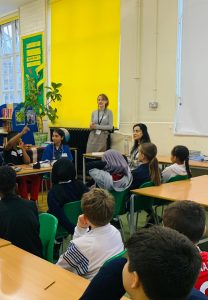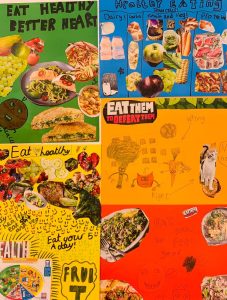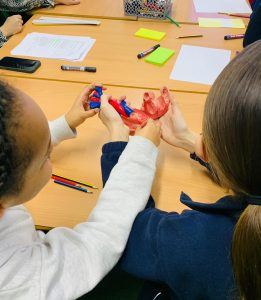by Dr Sian Powell, Dr Faye Maxwell-Carr, Dr Amina Mirza and Dr Aaliya Mohammad
Widening access to healthcare professions is a key priority of the Department of Primary Care and Public Health. The recent publication of Health Education England’s ‘Training the Future GP’ report (2023) places a new emphasis on growing health inequalities and the need to train socially accountable GPs who are better equipped to understand and address the needs of their local communities. By increasing diversity, we incorporate a broader range of perspectives, experiences and cultural insights that can enhance the quality of patient care by promoting cultural competence, empathy and understanding.

Therefore, when a local school invited us to support their science week, we jumped at the opportunity. The school is located in the borough of Hammersmith and Fulham, a diverse community facing challenges of income and health deprivation (5/10 on the Index of Multiple Deprivation). We saw an opportunity to not only support the school’s STEMM curriculum, but also for pupils to interact with doctors to understand our role and the significance of primary care, and we aimed to inspire the pupils to consider a future career in community healthcare.
Working in partnership with the local primary school teachers and with Steph Powell (Community Collaboration Lead for the Undergraduate Primary Care Education Unit), Sukhi Ubhi (Coordinator for the Medical Education Innovation and Research Centre) and Sian Powell (Faculty Development Lead), we co-designed and delivered a half-day workshop for 26 school pupils aged 10 to 11 on the subject of ‘Healthy Hearts’.
We designed a series of short, interactive and engaging stations for the pupils on topics such as the anatomy and physiology of the circulatory system where pupils explored 3D heart models, completed drawings and worksheets. Pupils took part in an interactive whole-class demonstration on how blood flows through the human body’s circulatory system. We completed the session with small group exercises exploring how blockages in the circulatory system develop and the impact this has on the body.
Pupils measured each other’s heart rate, oxygen saturations and blood pressure with bedside equipment used by GPs such as peripheral pulse oximeters and blood pressure monitors. They were able to explore the impact of exercise after doing a series of star-jumps. Finally, pupils participated in a simulated role-play of a patient attending their local GP practice with symptoms and signs of a heart attack. They assisted the GP in their assessment of the patient in this role-play and arranged safe transfer to hospital by calling an ambulance, gaining an understanding of the role of a GP in an acute emergency. 
When the simulated patient returned to their GP practice three weeks later, pupils helped the GP advise the patient on health promotion, which helped them to understand the role of a GP in holistic care and disease prevention. Finally, pupils created posters to display in GP practice waiting rooms to communicate key messages to the local community on healthy food choices. Each group presented their poster and explained the reasoning behind their choices and how these could improve the health outcomes of the wider community.
Given the multicultural local populace of Hammersmith and Fulham, we tailored the workshop content so that it was engaging and inclusive for the children. We ensured that inclusive language was used across the spectrum of language abilities and learning differences, and we provided nutritional information on various cultural diets that they could use for their patient posters.
The workshop concluded with a Q&A session where it became clear that the pupils, despite their young age, were aware of and engaged with contemporary media coverage of the NHS. They asked us what we thought of the junior doctors’ strikes, and enquired as to how much doctors are currently paid. We were also encouraged to share the reasons why we had chosen to become doctors, allowing us to communicate our enthusiasm and passion for the profession, despite the systematic difficulties it is currently facing. We were therefore able to challenge some of the media misrepresentation of doctors, providing a more positive perspective on the value of being a doctor in today’s NHS. 
Our primary aim had been to educate primary-school children about the role of GPs in maintaining the health and well-being of the community, and this achievement was reflected in feedback from the pupils; 68% of whom felt that the session had changed their understanding of what a GP does. Several pupils also expressed an interest in a career in medicine following the workshop. The teacher’s feedback was also overwhelmingly positive, telling us that we had inspired the pupils to expand their ideas of what careers could be possible for them, and that the pupils were still “happily recounting the activities from the day” a week on from the workshop.
Personally, we felt proud to deliver a session that was aimed at introducing pupils, at a young age, to careers they may not have considered previously. Witnessing the pupils’ excitement and engagement with the session not only renewed our awareness of the ways we can contribute to the communities we serve as healthcare professionals, in and out of clinical settings, but also gave us hope that, despite all the present challenges, the future of medicine is in safe hands.
Names and roles of authors
Sian Powell (Faculty Development Lead, Undergraduate Primary Care Education Unit, Imperial College London)
Faye Maxwell-Carr (GPST1, Imperial VTS)
Amina Mirza (GPST1, Central Middlesex VTS)
Aaliya Mohammad (GPST1, Imperial VTS)